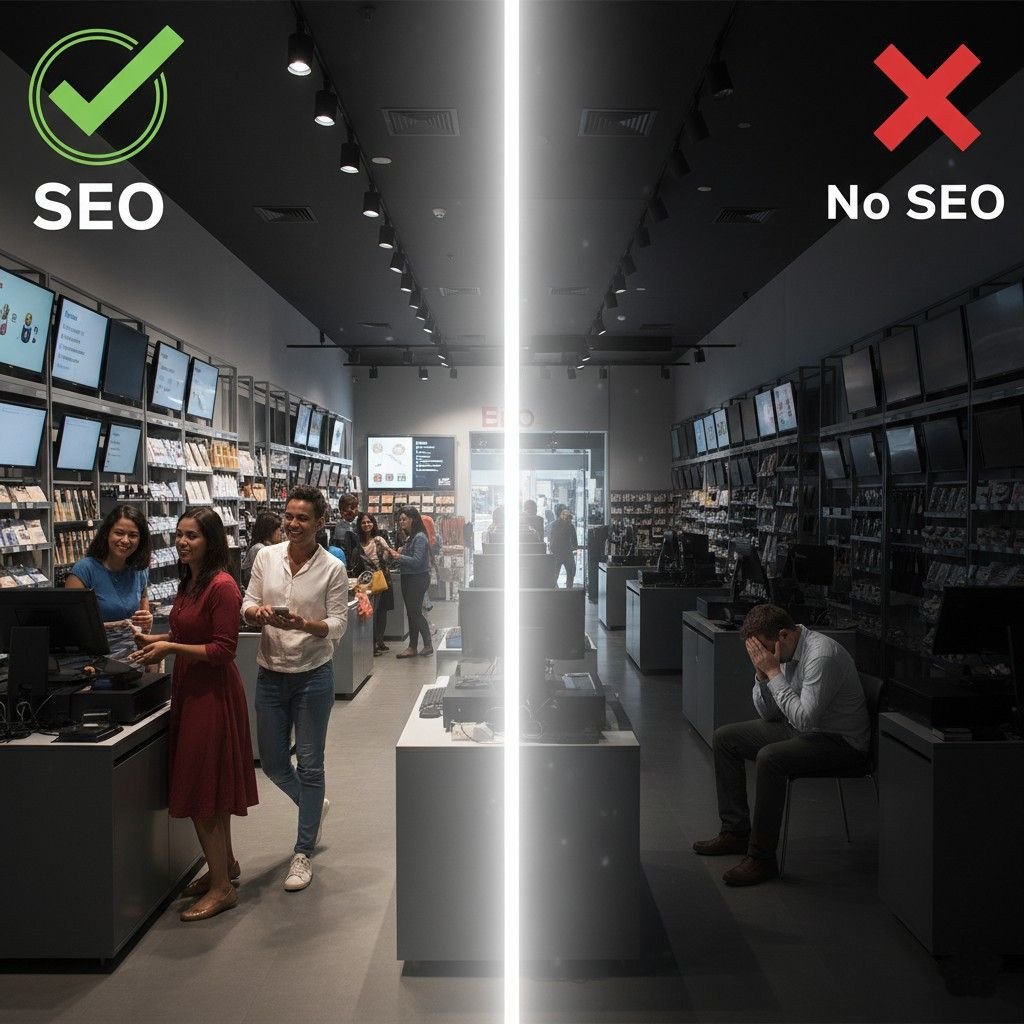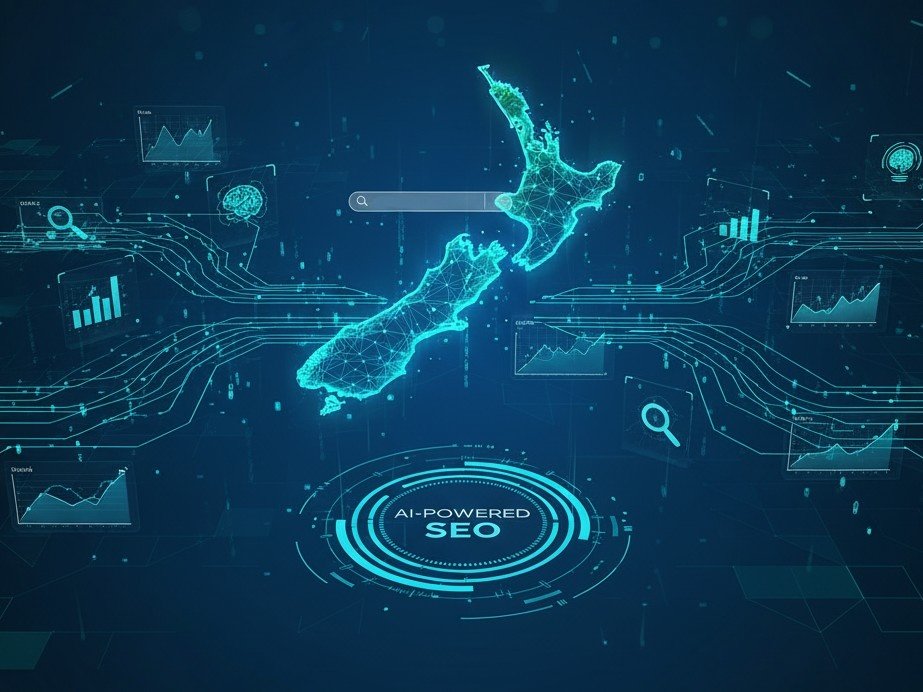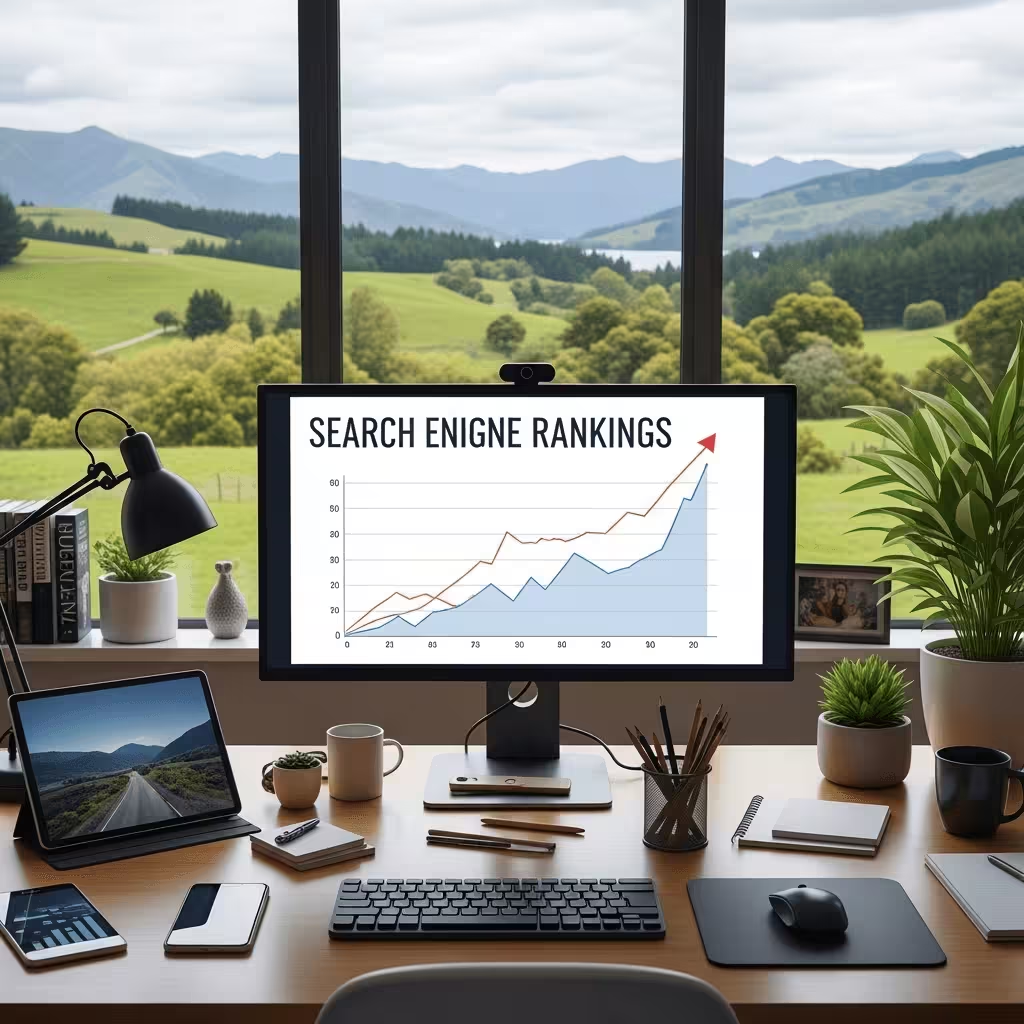AI is redefining SEO for New Zealand businesses, rewarding clarity, credibility, and local expertise over keyword density. Success now depends on structured, trustworthy content that helps AI systems understand who you are, what you do, and why customers can trust you.
1. How SEO Has Evolved
The Shift From Keywords to Meaning
SEO has always evolved alongside technology, but the transformation happening in 2025 is unlike anything before. In earlier years, success in search came from technical optimisation: using the right keywords, collecting backlinks, and writing long-form pages designed for Google’s crawlers. Those fundamentals still matter, but search has become much more intelligent. Algorithms now understand meaning, intent, and the relationships between ideas rather than just matching words.
From Page-Level to Paragraph-Level Ranking
Traditional SEO was built around web pages. Search engines would scan a page, measure keyword relevance, count backlinks, and then decide how it compared to competitors. In today’s environment, that method is only part of the picture. Modern search engines look deeper. They break each page into smaller, topic-based sections that can be understood independently. This change is powered by artificial intelligence and natural language processing.
AI-driven search systems such as Bing Copilot, ChatGPT Browse, and Perplexity interpret language more like humans. They read each paragraph as a self-contained explanation and then rank it based on how clearly it answers a question. A single well-written paragraph can now appear in an AI-generated summary even if the full page does not rank first on Google. Clarity and structure have become just as important as backlinks and metadata.
Authority and Trust in the AI Era
This shift has also redefined how authority is evaluated. Search models no longer rely solely on backlinks or technical SEO signals. They assess trustworthiness through real-world indicators such as awards, reviews, and brand mentions. Google’s E-E-A-T framework — Experience, Expertise, Authoritativeness, and Trustworthiness — still underpins rankings, but AI interprets these qualities through meaning, not metrics.
A clear, factual paragraph that demonstrates expertise or local experience can now outperform a keyword-optimised page from a larger domain. In this environment, the best-performing content is not the most repetitive but the most relevant and credible.
For New Zealand businesses, visibility now depends on clarity and credibility, not just size or longevity. Smaller, specialised companies can compete effectively if their websites communicate local expertise, real experience, and trustworthy service information. Clear paragraphs about your work, your region, and your reputation help AI engines understand and recommend your business.
A Level Playing Field for Local Businesses
This evolution has created new opportunities for every industry. A Christchurch painter, a Wellington law firm, or a Queenstown tourism operator can appear in AI search results if their content explains what they do with precision and transparency. Businesses that thrive will be those that focus on quality communication — writing that is specific, helpful, and easy for both people and machines to understand.
Understanding how SEO has evolved is essential for adapting your marketing strategy this year. The next section explores how AI search engines work and why they are transforming the way users find and trust information online.

2. The Rise of AI Search Engines
From Search Queries to AI Conversations
Search is no longer just about typing a few words into Google and scrolling through a list of links. In 2025, artificial intelligence has completely reshaped how people find information online. Tools such as ChatGPT Browse, Bing Copilot, and Perplexity allow users to ask natural questions and receive summarised, conversational answers. These systems are built to provide understanding rather than just options, changing the nature of how visibility and trust are earned in search.
How AI Search Engines Work
AI search engines still rely on large indexes like Bing’s, but the way they process information is far more advanced than traditional methods. Instead of analysing an entire web page as a single unit, AI models divide it into smaller sections known as paragraph chunks. Each chunk is scored for meaning, clarity, and factual accuracy before being stored for retrieval.
When a user searches, the AI retrieves and ranks the most relevant paragraphs to build its response. The result is often a direct answer that includes summarised insights or quoted text from trusted sources. This process has introduced a new level of competition: one well-written paragraph can now outperform an entire page if it provides the clearest and most relevant explanation.
AI search engines do not rank pages — they rank ideas. Each paragraph competes on how clearly it explains one concept, how credible its source is, and how accurately it answers the user’s question.
What Determines Visibility in AI Search
For businesses, visibility in AI search depends on how clearly and confidently information is presented at the paragraph level. Even if your site does not rank first on Google, your content can still appear inside AI-generated answers if it provides valuable, trustworthy insights. This change gives smaller, high-quality brands new opportunities to compete with established players.
AI search engines evaluate three main factors when deciding what content to retrieve and cite:
- Clarity: Each paragraph must explain one idea simply and directly so the AI can interpret it without ambiguity.
- Context: The information must align naturally with the topic and the searcher’s intent, showing relevance to your area of expertise.
- Credibility: The content should come from a trusted source, supported by reviews, citations, or external brand mentions.
Ranking, Representation, and Retrieval
This evolution has changed what it means to “rank” online. Traditional search results are still relevant, but AI-generated summaries now capture much of users’ attention. Many people receive their answers without ever clicking a link. That makes brand presence within AI summaries as valuable as page-one visibility on Google. Businesses need to think not just about rankings but about representation — how their expertise is described and cited in AI answers.
The Importance of Bing and Local Signals
Bing plays a central role in this new ecosystem. Its index powers both Microsoft Copilot and ChatGPT’s browsing features, which means websites that perform well in Bing search are more likely to appear in AI-generated responses. Monitoring Bing indexing, ensuring your site’s content is structured and crawlable, and maintaining local relevance are now essential steps for SEO success.
For New Zealand businesses, this also means using local signals such as city names, regional service areas, and .co.nz domains. These details help AI correctly identify where you operate and who your content serves, improving your visibility in regionally focused searches.
To adapt, focus on content that reads well for both humans and machines. Break information into logical sections, use headings and lists for structure, and include factual, verifiable statements that reinforce trust. This clarity improves user experience and makes your paragraphs easier for AI systems to understand, retrieve, and recommend.
The next section explores what these changes mean for New Zealand businesses and how to stay visible in this evolving search environment.

3. What This Means for New Zealand Businesses
AI Search and Local Visibility
The rise of AI-powered search engines has major implications for how New Zealand businesses approach SEO. While global algorithms determine how content is processed, local context decides how well your business appears when customers search nearby. In 2025, local optimisation is no longer limited to Google Business Profiles or backlinks. It now relies on clear, trustworthy writing that helps AI systems understand exactly who you are, what you do, and where you operate.AI models are designed to recognise relationships between entities. For a local business, this means the AI must confidently connect your brand name with your services, region, and reputation. Simply mentioning Christchurch, Wellington, or Auckland once is not enough. Instead, create well-structured paragraphs that describe your service area, expertise, and customer value in plain language. This helps AI retrieval systems recognise your relevance for regional searches.Authority and Trust Signals
Authority is still essential, but AI has changed how it is measured. Traditional link building remains valuable, yet AI search engines give added weight to external mentions and verified citations. Local directories, media articles, and trade associations all help validate your business as credible. Reviews also carry greater influence because AI summarisation often references customer sentiment when describing a company. A strong local reputation can make your brand appear in AI summaries even if your organic rankings are modest.For New Zealand businesses, AI search rewards clarity and authenticity over keyword volume. Write naturally about your services, experience, and qualifications so AI systems can recognise your brand as trustworthy and locally relevant.
Creating Content Around Real Customer Intent
To build visibility, focus on the questions your customers actually ask. AI engines prioritise intent-based content that provides clear, useful answers. For example, a Canterbury painter might write about “How much does house painting cost in Christchurch?” or “How to prepare your home for repainting in New Zealand’s coastal climate.” These kinds of posts reflect genuine search behaviour and demonstrate firsthand experience that AI models can confidently retrieve.Strengthening Your Technical Foundation
Strong technical SEO remains a critical part of AI-era optimisation. Structured data, clean code, and consistent business details all help search engines understand your brand. Use schema markup for LocalBusiness and Service to confirm your information. Maintain consistency across your website, Google Business Profile, and other listings so AI systems can verify your business identity.- Use schema markup to describe your services and reviews.
- Ensure your address, phone number, and hours are identical everywhere online.
- Keep image tags and metadata descriptive and locally relevant.
- Review your Bing indexing alongside Google Search Console data.
Building Digital Clarity
The future of SEO for New Zealand businesses is built on clarity. Every paragraph, image tag, and external citation should reinforce who you are, where you operate, and why customers can trust you. By focusing on quality, consistency, and contextual relevance, your business can increase visibility in both Google results and AI-generated answers.The next section explains how Jared Lean Digital helps New Zealand companies apply these strategies, combining proven SEO foundations with modern, AI-optimised methods.
4. Why Choose Jared Lean Digital for SEO
A Partner for the New Era of Search
Choosing the right SEO partner is about more than improving rankings. It is about working with a team that understands how search has evolved and how artificial intelligence now interprets and evaluates content. Jared Lean Digital helps New Zealand businesses transition from traditional SEO methods to modern, AI-optimised strategies that increase visibility and trust.
Our approach combines data-driven analysis with deep local knowledge. We focus on creating structured, meaningful content that both users and AI systems can understand. Every paragraph, heading, and piece of metadata is written to help search engines interpret what makes your business credible and relevant.
We optimise for how AI reads your business, not just how Google ranks it. Our goal is to make your brand visible, credible, and consistently retrievable across traditional search engines and AI-generated results.
Helping NZ Businesses Stay Visible
New Zealand businesses now compete in an environment where AI summarisation and search automation influence how customers find information. Jared Lean Digital builds strategies that combine proven SEO foundations with AI-driven optimisation. We integrate technical SEO, structured data, and content clarity to help your brand remain visible, accurate, and trustworthy across every major search platform.As search continues to evolve, our focus remains the same: building lasting visibility through quality content, local relevance, and measurable digital authority. The next section explores what lies ahead for SEO in New Zealand and how to future-proof your business for the AI era.
5. The Road Ahead
From Algorithms to Understanding
SEO in 2025 is no longer about gaming algorithms or chasing search positions. It is about clarity, credibility, and consistent communication. As AI search engines continue to evolve, the way information is discovered and displayed will keep changing. Businesses that adapt early by producing clear, trustworthy, and well-structured content will gain lasting visibility in this new environment.
AI Tools and Personalised Search
The next stage of SEO will be shaped by artificial intelligence. New AI-assisted tools will guide content creation, topic planning, and personalised search recommendations. These systems reward brands that maintain accuracy and expertise across their online presence. Websites with clear structure, local relevance, and strong factual depth will remain visible, while keyword-heavy or shallow content will gradually lose traction.
The businesses that win the future of SEO will be the ones that write clearly, prove expertise, and build trust. AI is not replacing SEO — it is redefining what effective optimisation looks like.
Action Steps for New Zealand Businesses
For New Zealand companies, success now depends on combining local authenticity with technical precision. Maintaining consistent business information, producing structured content, and building positive brand signals are all key to earning trust from AI systems and search users alike.
- Keep your website information, Google Business Profile, and directory listings consistent.
- Write short, factual paragraphs that focus on one idea at a time.
- Use schema markup for your business, services, and reviews.
- Monitor Bing indexing and AI referral traffic as closely as Google analytics.
- Create content that reflects real experience and demonstrates your expertise.
Adapting to the Future of SEO
The landscape of search will continue to shift, but the direction is clear. AI is making accuracy, structure, and trust the foundation of visibility. Businesses that prioritise clarity, authenticity, and ongoing optimisation will remain visible and competitive across every platform — from Google Search to AI-generated answers.
Now is the time to prepare. Review your core website content and ensure that each key section communicates clearly what your business offers and why customers can trust you. Focus on writing simple, well-structured paragraphs that explain one idea at a time. By improving clarity and consistency, your business can secure its position in the next generation of search, where being understood is more powerful than being over-optimised.



